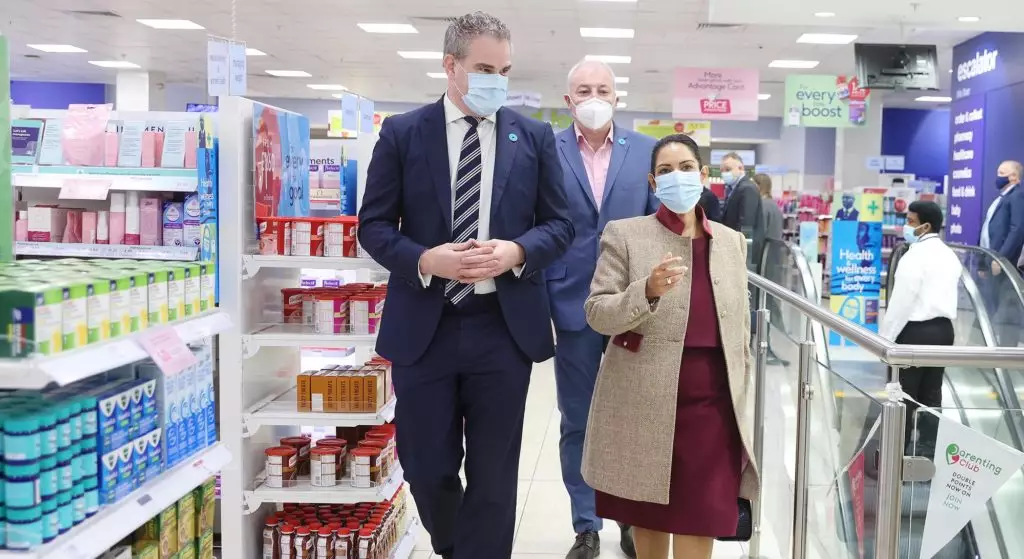
Boots
If the rumours are true, Boots is headed for a major change.
Since mid-January 2022, reports have suggested two private equity firms, and the billionaire owners of supermarket chain Asda, are drawing up bids to buy the multiple from its current parent company Walgreens Boots Alliance (WBA).
Such a move towards private equity has a history of triggering alarm bells. In 2007, after private firm Kohlberg Kravis Roberts bought Alliance Boots — Boots UK’s parent company at the time — for £11bn, the company was forced to publicly ease fears of closures and layoffs following the merger.
But alarm bells are likely already ringing for Boots’ pharmacy teams on the frontline.
The multiple saw its profits fall for three consecutive years in 2018, 2019 and 2020, tumbling by 255% year-on-year during the latter, owing to the COVID-19 pandemic.
In 2019, WBA announced the closure of 200 “loss making stores”, nearly all of which are now confirmed to have closed. And, more recently, in November 2021, Boots announced the closure of pharmacy provision within 22 Boots retail stores, creating a new type of ‘pharmacy-less’ Boots.
Despite this, Boots’ chief pharmacist Marc Donovan has led his pharmacy team through, what he describes as “an acceleration of the profession” during the pandemic.
The Pharmaceutical Journal sat down with Donovan to hear what 2022 holds for the multiple and for community pharmacy as a whole.
How do you see 2022 being different from 2021 for Boots’ pharmacies?
Certainly, 2021 has been dominated by the pandemic and I expect the early stages of 2022 to be dominated by coronavirus. But, as it moves from being a pandemic to endemic — which many experts are predicting will happen in 2022 — I think that will ensure that we see a more settled healthcare system. And community pharmacy and Boots have a really important role to play in the resetting and recovery post-pandemic, and in providing solutions to the healthcare system as we move forward.
Will pharmacies be able to maintain their current level of COVID-19 vaccine delivery and keep up with core services?
We have administered more than 1.2 million COVID-19 vaccines through about 100 pharmacies across the UK. I think, using that experience, we will be able to change the way that we approach services. There are opportunities for us to provide more vaccinations.
It’s yet to be seen whether COVID-19 vaccines will become the norm, like flu vaccines. I think community pharmacy, and Boots as a whole, would be able to deliver the vaccine demand and patients will expect that. They like receiving their flu vaccines in community settings. I’m sure that will be the case if we get into a cadence of regular COVID-19 vaccines.
Why did Boots take the decision to expand its private service offering in 2021?
The delivery of private services through community pharmacy is certainly growing and we think that’s good for patients and, importantly, good for the NHS as well. We have seen an increasing demand for private healthcare services that pharmacies like Boots have been delivering over the past year or so.
We want to demonstrate to the NHS that community pharmacy has a wider role to play in providing prescribing services and treating minor ailments
The availability of that kind of service — we’ve demonstrated that it has alleviated some of the pressure from the NHS by taking non-complex healthcare interventions away from GP surgeries. That’s something that the NHS is desperate to have happen.
While we are exploring a private set of services, we want to be able to demonstrate to the NHS that community pharmacy has a wider role to play in providing prescribing services and treating minor ailments.
The use of independent prescribing skills in the community on behalf of the NHS is something that I would want to see as we progress through 2022 because I think we can provide more solutions to some of the issues that the NHS is now seeing in the middle of the pandemic.
Would those private services continue if they became commissioned by the NHS?
Utilising pharmacists’ and pharmacy technicians’ skills inside the NHS as an NHS service is absolutely what we want to see happen. We recognise though that the NHS has limited funds and will not be able to provide everything to everyone.
And so, there will be a place for private services to push the boundaries of practice in community pharmacy and help the NHS navigate how they provide a service, such as prescribing in contraception or prescribing in chronic conditions such as diabetes, or mental health services. We would want to explore all of these in a private way before bringing that solution to the NHS.
Can you tell me more about the private mental health service you’re looking to provide?
We’ll soon be launching a private mental health service through our ‘Online doctor’ service. As I’m sure many people will know, it’s hard to access mental health support through the NHS at the moment and the demand is huge, so we feel that we can help patients navigate some of the mental health demands that they have.
Will the service be based on prescribing or take the form of an app?
It will be a mixture of both. Primarily, it will be counselling support apps, management of people’s mental wellbeing, and certainly not in the complex areas. However, through regular contact with a prescriber, there may well be some solutions that would result in prescribing of some medication. But that’s not first line and that’s not what the service is designed for. We would apply the National Institute for Health and Care Excellence guidance, of course, to those interventions and they will be overseen by the prescribing doctor anyway, or the prescribing pharmacist.
How many independent prescribing pharmacists is Boots training in 2022?
We currently have 400 independent prescribers that work for us. And we have plans to train more independent prescribers before the 2026 point, where they’ll come up into the profession with that qualification.
We recognise that we need to invest and we have and will continue to do so through our pharmacists’ development fund
Will Boots fund the training themselves or use the funding promised from NHS England for this purpose?
It’ll be a mixture. The £16m from Health Education England is not going to be enough at all. And, of course, that £16m is for five things, only one of which is to expand clinical capability for community pharmacists. And that doesn’t include, necessarily, independent prescribing, so that’s not going to last long. We recognise that we need to invest and we have and will continue to do so through our pharmacists’ development fund.
What progress has been made on the talks around pharmacy apprenticeship proposals?
We’re part of the employer group that is looking into this and it’ll go to a public consultation soon.
To be honest, I’m not convinced that this is the right thing for pharmacy, but what I desperately do want to happen is to have a conversation about it. We certainly see nurses having apprenticeships and there are moves to bring in apprenticeships in medicine as well. Is it right for pharmacy? I don’t know.
We need diversity in the profession and pharmacists from different backgrounds. And if the apprenticeship route gives opportunity for those people, who are less privileged, who can’t go to university, then I’m all for exploring that and making it happen.
It’s certainly not something I believe will dilute the quality of pharmacy undergraduates, because the standards are there and we have to meet them.
What are your reservations about the apprenticeship programme?
It’s a challenging course — to go through university full stop. And five years — four years in university, with a foundation year now — is quite a demand on a person. To add in working around that learning, I think that would be quite challenging. And I would want to explore how that would work in reality.
How many of the 200 stores earmarked for closure in 2019 have now closed?
We live in a changing market environment, so for me to say that there will be no further store closures, I wouldn’t be able to say that. Of course, we will open some. Sometimes that means we close some.
We’ve already announced that we’ve closed 22 pharmacies as part of an ongoing phase of that review. But, equally, we’ve opened almost 20 stores in 2020 and 2021. And that’s what we do as an organisation.
[A spokesperson for Boots later added that the 200 stores have now largely closed.]
How have Boots’ plans to roll out a patient medication record system that would allow patients and GPs to check medicine stock progressed?
That was launched back in October 2021. The Columbus patient medication record system allows us to have visibility of what’s in stock in each individual store. So, patients can go onto Boots.com and search for the prescription stock checker, put in a drug and the strength of it, and it will tell them the locations of the Boots which have stock.
But one of the big drivers for it was the foundation of the palliative care service. The service guarantees that we have a stock of a set formulary of 14 palliative care medicines in every one of our pharmacies. The checker allows, not just patients and carers, but also palliative care teams to search for palliative care medicines that are commonly used.
Where do you stand on the debate around supervision?
Supervision is a very interesting topic that is clouded by some inconsistency in interpretation. I am certainly against having a pharmacist overseeing the operations of a number of different pharmacies and always have been. And I think a number of people interpret supervision changes to be in that category.
But, if we are a progressive profession and we want our pharmacy teams to be innovative, I do think we need to be clear on what our pharmacists can do and how we can develop our pharmacy technicians, so that they can run the operations of a dispensary; for example, so pharmacists can have capacity to make a bigger impact on patient care.
In July 2021, we reported that pharmacy staff in 60 Boots stores were trialling the use of body cameras to prevent abuse from patients. Has that pilot rolled out further?
We had piloted the body cam in certain areas — parts of London, around Birmingham and Sheffield.
We think there’s a role that the government can play. We want new legislation, looking at violence against retail workers extended to pharmacies. We want to do all that we can to make sure our team members feel safe at work.
[A spokesperson for Boots later added that body cameras were now used in 80 Boots stores.]

Boots
How successful has the ‘Ask for ANI’ scheme been at Boots stores?
I’ve been really pleased at how our pharmacy teams have adopted the initiative. The stories that we have experienced of being able to impact, not just victims of domestic abuse, but the family and the children, and starting them on a different life just demonstrates how important this intervention is.
[A spokesperson for Boots later added that community pharmacy has helped at least 100 people through the ‘Ask for ANI’ scheme and that, as the largest pharmacy offering the scheme, Boots has made up a large portion of this.]


